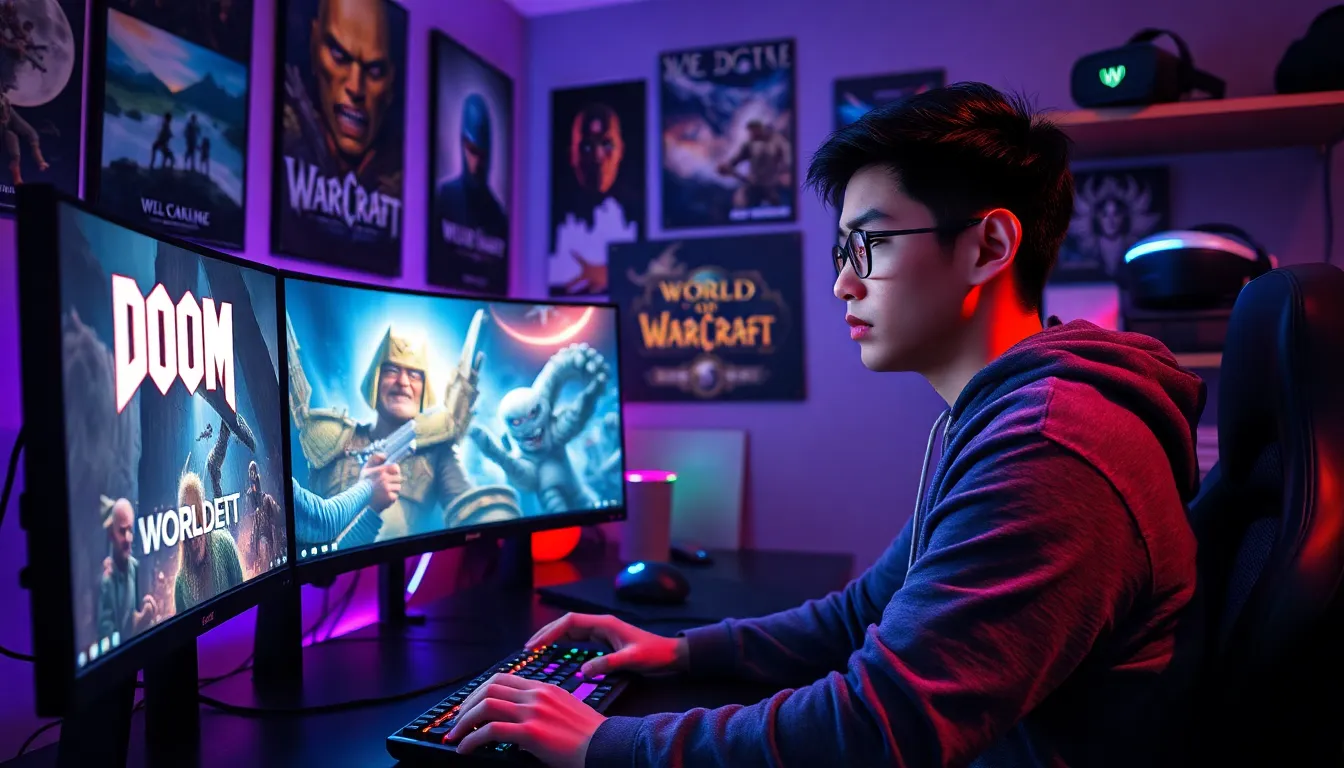In the vast, ever-evolving world of gaming, PC gaming stands out not just for its accessibility but for its intricate community and diverse experiences. As technology advances and gaming culture shifts, it’s crucial to look back and appreciate where it all began, where it’s heading, and the unique challenges it faces. This article dives into the evolution of PC gaming, the vibrant gamer culture, the wide-ranging genres that captivate players, essential hardware considerations, future trends, and controversies that shape the landscape today. Let’s embark on this journey through the realm of PC gaming.
Table of Contents
ToggleThe Evolution Of PC Gaming

PC gaming has undergone a remarkable transformation since its inception. In the early days, the landscape was dominated by simple text-based games and primitive graphics. Titles like “Pong” and “Space Invaders” were groundbreaking at the time but couldn’t prepare gamers for the rich visual experiences to come.
As the 1990s rolled in, graphics and gameplay mechanics advanced significantly. Games like “Doom” and “Warcraft” introduced immersive environments and storytelling, paving the way for real-time strategy (RTS) and first-person shooter (FPS) genres. The introduction of graphics cards, particularly NVIDIA and ATI, enhanced visual realism, making gaming more appealing and engaging.
Fast forward to the 2000s: the emergence of massively multiplayer online games (MMOs) like “World of Warcraft” revolutionized social gaming, allowing players from around the globe to connect and collaborate. The introduction of digital distribution platforms, such as Steam, further changed the game by making it easier for developers to sell their products directly to consumers.
Today’s PC gaming world is a robust ecosystem, filled with indie games, complex narratives, and diverse gameplay styles that cater to a broad audience. The advent of virtual reality (VR) and augmented reality (AR) is just the latest chapter in an ongoing narrative that ensures PC gaming remains at the forefront of technological advancements.
Gamer Culture And Community
The culture surrounding PC gaming is diverse and multifaceted. From Twitch streams to gaming conventions like PAX and E3, gamers have created communities that foster friendship, competition, and collaboration. These spaces are not just about playing games: they’re about sharing experiences and forming connections.
Twitch, for example, has become a significant platform where gamers can showcase their skills, provide commentary, and engage with viewers in real-time. This has led to the rise of influencer culture, where top gamers can turn their passion into a lucrative career.
Also, social media platforms like Discord provide gamers a place to chat, strategize, and celebrate their shared interests. Whether it’s through casual conversations about favorite titles or organized game nights, these platforms help reinforce bonds between players.
But, this community is also not without its challenges. Issues such as toxicity, harassment, and inclusivity have permeated gaming culture. Many organizations and individuals champion diversity in gaming, working diligently to create a more welcoming environment for everyone.
Top Genres In PC Gaming
Diversity in gaming genres is one of PC gaming’s greatest strengths. From action-packed FPS games to deep strategy mechanics, there’s something for everyone. Here are some of the top genres that players gravitate towards:
First-Person Shooters (FPS)
Typically known for their action and fast-paced gameplay, FPS games like “Counter-Strike: Global Offensive” and “Call of Duty” provide thrilling experiences where players can engage in teamwork or individual challenges.
Role-Playing Games (RPG)
RPGs like “The Witcher 3” and “Elder Scrolls V: Skyrim” allow players to immerse themselves in vast worlds, crafting their journeys through intricate storylines and character developments.
Strategy Games
Games in this category, such as “Civilization VI” and “StarCraft II,” require players to think critically, ensuring their decisions lead to victorious outcomes.
Simulation Games
Titles like “The Sims” and “Microsoft Flight Simulator” offer players unique scenarios where they can build, manage, or even simulate real-world experiences, appealing to those who enjoy creativity and strategy.
Indie Games
The indie gaming scene has exploded, providing unique narratives and innovative gameplay mechanics. Games like “Hades” and “Celeste” demonstrate that creativity is not limited to big studio productions.
Essential Hardware For PC Gamers
The PC gaming experience is significantly influenced by the hardware used. Here are some essential components that every gamer should consider:
CPU (Central Processing Unit)
The brain of the computer, the CPU plays a crucial role in gaming performance. Processors from Intel and AMD ensure smooth gameplay and quick application loading times.
GPU (Graphics Processing Unit)
A vital component for any PC gamer, the GPU significantly enhances visual quality and performance. Modern titles demand robust GPUs like those from NVIDIA’s RTX series or AMD’s Radeon line.
RAM (Random Access Memory)
Having sufficient RAM is crucial for multitasking and smooth gameplay. A minimum of 16GB is generally recommended for a satisfying experience.
Storage Solutions
Opt for SSDs (Solid State Drives) for faster load times and general performance boosts. Many gamers prefer a combination of SSDs for the operating system and HDDs (Hard Disk Drives) for mass storage.
Peripherals
This includes monitors that support high refresh rates, mechanical keyboards, and high-DPI mice, all of which enhance the overall gaming experience.
The Future Of PC Gaming
The future of PC gaming is bright and filled with potential innovations. With ongoing advancements in technology, gamers can expect improvements in several areas:
Hardware Advancements
The rise of AI-driven gaming is on the horizon, promising even more personalized experiences tailored to gamers’ skills and preferences. Enhanced graphics with ray tracing technology and faster refresh rates will elevate immersion levels.
Cloud Gaming
The growth of cloud gaming services such as NVIDIA GeForce NOW and Google Stadia signifies a shift where gamers no longer need dedicated hardware to enjoy high-quality games. This democratizes gaming, enabling more people to access top titles without a significant financial investment.
VR and AR Integration
As VR and AR technologies become more accessible, they’ll play a larger role in shaping gameplay experiences, bringing players closer to their virtual worlds. Experiences can become even more immersive, allowing for real-world-like interactions.
Continued Focus on Community
Game developers are increasingly focusing on community engagement via forums, feedback sessions, and updates. This may lead to more player-centric design processes, ensuring games resonate with their audience.
Challenges And Controversies In The PC Gaming Scene
Even though its many successes, the PC gaming community faces its fair share of challenges and controversies:
Toxicity and Harassment
Unfortunately, the rise of online multiplayer gaming has led to increased toxicity and harassment among players. This behavior can dissuade newcomers and create a negative environment.
Game Piracy
As games become more sophisticated, so do the methods employed for piracy. This not only affects developers financially but also risks leading to security issues for unwitting players.
Representation and Inclusivity
Debates about representation in gaming are ongoing. Many gamers advocate for greater diversity in character representation and storylines to reflect the global audience that gaming now reaches.
Balance Between Monetization and Fairness
Developers are grappling with how to monetize games without compromising the player experience. The fine line between earning profit and providing a fair playing environment is a hot topic in the industry.
Conclusion
The journey of PC gaming has been a fascinating blend of nostalgia, innovation, and community. As technology continues to advance, it expands the horizon for what PC gaming can be, fostering camaraderie among players near and far. With its challenges and controversies, the community must focus on inclusivity and positivity, ensuring that gaming remains a space where everyone feels welcomed. Eventually, the evolution of PC gaming is just beginning, and the future holds even more promise for gamers across the globe.


